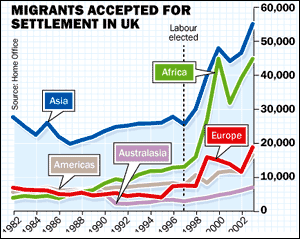
This post is on latest changes in UK immigration law – from Sandeep Kainth, an immigration lawyer in the UK. Sandeep plans to write a series of blogposts for Indians planning to immigrate and those who want to learn about UK immigration law. This is the first post from him.
I first started blogging some time ago to share my knowledge on Immigration law, under the UK Jurisdiction. I enjoy researching complex cases and achieving results! The Immigration law is changing quite rapidly in the UK.
On 11th June the Government announced changes in the Immigration Law for Non-European Economic Area (NON EEA) these changes will affect people wanting to enter or stay in the UK depending on their private or family life.
I deal with cases from all over the world, and see the demand of people wanting to enter the UK. I also am aware as to how some people spend their life savings for their son/daughter/relative to work study or settle in the UK.
These changes are taking place to help the Governments programme to reform Immigration, and to follow consultation and specialists advice from the ‘MIGRATION ADVISORY COMMITTEE’ these mainly come into effect on the 9th July; 2012.
Below is a description of some of the changes that shall be taking place
1. Introducing a new minimum income of (£18,600) for sponsoring the settlement in the UK of a spouse or partner, or fiancé(e) or proposed civil partner of non-European Economic Area (EEA) nationality, with a higher threshold for any children also sponsored; £22,400 for one child and an additional £2,400 for each further child;
2. Publishing, in casework guidance, a list of factors associated with genuine and non-genuine relationships, to help UK Border Agency caseworkers to focus on these issues;
3. Extending the minimum probationary period for settlement for non-EEA spouses and partners from two years to five years, to test the genuineness of the relationship;
4. Abolishing immediate settlement for the migrant spouses and partner where a couple have been living together overseas for at least 4 years, and requiring them to complete a 5 year probationary period;
5. From October 2013, requiring all applicants for settlement to pass the ‘Life in the UK Test’ and present an English language speaking and listening qualification at B1 level or above of the Common European Framework of Reference for Languages unless they are exempt;
6. Allowing adult and elderly dependants to settle in the UK only where they can demonstrate that, as a result of age, illness or disability, they require a level of long-term personal care that can only be provided by a relative in the UK, and requiring them to apply from overseas rather than switch in the UK from another category, for example as a visitor; and
7. Restricting family visit visa appeals, initially by narrowing the current definitions of family and sponsor for appeal purposes, and then, subject to the passage of the Crime and Courts Bill, which was published on 11 May 2012, removing the full right of appeal against refusal of a family visit visa.
Sandeep Kainth is an experienced Immigration Lawyer; he is passionate about helping people to understand the changes that are occurring in the UK – E-mail: [email protected]
 Serato DJ Crack 2025Serato DJ PRO Crack
Serato DJ Crack 2025Serato DJ PRO Crack










 Allow notifications
Allow notifications


